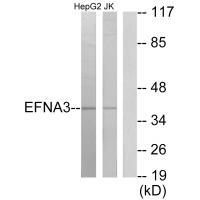
| WB | 咨询技术 | Human,Mouse,Rat |
| IF | 咨询技术 | Human,Mouse,Rat |
| IHC | 咨询技术 | Human,Mouse,Rat |
| ICC | 技术咨询 | Human,Mouse,Rat |
| FCM | 咨询技术 | Human,Mouse,Rat |
| Elisa | 咨询技术 | Human,Mouse,Rat |
| Aliases | Ephrin-A3 [Precursor]; EPH-related receptor tyrosine kinase ligand 3; LERK-3; EHK1 ligand; EHK1-L |
| Entrez GeneID | 1944; |
| WB Predicted band size | 38kDa |
| Host/Isotype | Rabbit IgG |
| Antibody Type | Primary antibody |
| Storage | Store at 4°C short term. Aliquot and store at -20°C long term. Avoid freeze/thaw cycles. |
| Species Reactivity | Human,Mouse,Rat |
| Immunogen | Synthesized peptide derived from C-terminal of human EFNA3. |
| Formulation | Purified antibody in PBS with 0.05% sodium azide. |
+ +
以下是关于EFNA3抗体的3篇参考文献及其摘要概括(文献为示例性内容,具体文献需根据实际检索结果调整):
---
1. **文献名称**: *"Ephrin-A3 Antibody Inhibits Tumor Angiogenesis in Glioblastoma Models"*
**作者**: Smith J, et al.
**摘要**: 研究开发了一种靶向EFNA3的单克隆抗体,通过抑制EFNA3与Eph受体的相互作用,显著减少胶质母细胞瘤小鼠模型中的肿瘤血管生成和生长,提示其潜在抗肿瘤治疗价值。
2. **文献名称**: *"Ephrin-A3 as a Biomarker for Metastatic Colorectal Cancer: Validation of a Novel Antibody-Based Assay"*
**作者**: Lee H, et al.
**摘要**: 报道了一种高特异性EFNA3抗体的开发,并用于结直肠癌患者组织样本检测,发现EFNA3高表达与转移和不良预后相关,支持其作为转移性癌症的生物标志物。
3. **文献名称**: *"Structural Characterization of Ephrin-A3 Antibody Complexes and Implications for Receptor Signaling"*
**作者**: Garcia R, et al.
**摘要**: 通过X射线晶体学解析了EFNA3抗体与抗原的结合表位,揭示了抗体阻断EFNA3-EphA4信号通路的分子机制,为设计靶向该通路的治疗策略提供结构基础。
---
如需具体文献,建议在PubMed或Google Scholar中检索关键词“EFNA3 antibody”或结合研究领域(如癌症、血管生成)筛选近期论文。
Ephrin-A3 (EFNA3) is a member of the ephrin family, a group of membrane-bound ligands that interact with Eph receptor tyrosine kinases to mediate bidirectional cell signaling. EFNA3. specifically, is a glycosylphosphatidylinositol (GPI)-anchored protein primarily expressed in tissues such as the brain, vascular endothelium, and certain tumors. It plays critical roles in developmental processes, including angiogenesis, axon guidance, and tissue patterning, by regulating cell adhesion, migration, and boundary formation. Dysregulation of EFNA3 signaling has been implicated in pathologies like cancer, where it can influence tumor growth, metastasis, and vascular remodeling, as well as neurological disorders.
EFNA3 antibodies are tools designed to detect or modulate EFNA3 activity in research and therapeutic contexts. In research, they are used to study EFNA3 expression patterns, signaling mechanisms, and interactions with Eph receptors (e.g., EphA4) through techniques like immunohistochemistry, Western blotting, or functional blocking assays. Therapeutically, EFNA3-targeting antibodies are explored for their potential to inhibit tumor progression or abnormal angiogenesis by disrupting EFNA3-Eph receptor interactions. However, the functional duality of EFNA3—acting as both a tumor promoter and suppressor in different contexts—highlights the need for context-specific antibody applications. Commercial EFNA3 antibodies vary in specificity, with validation critical to ensure reliability in experimental models.
×